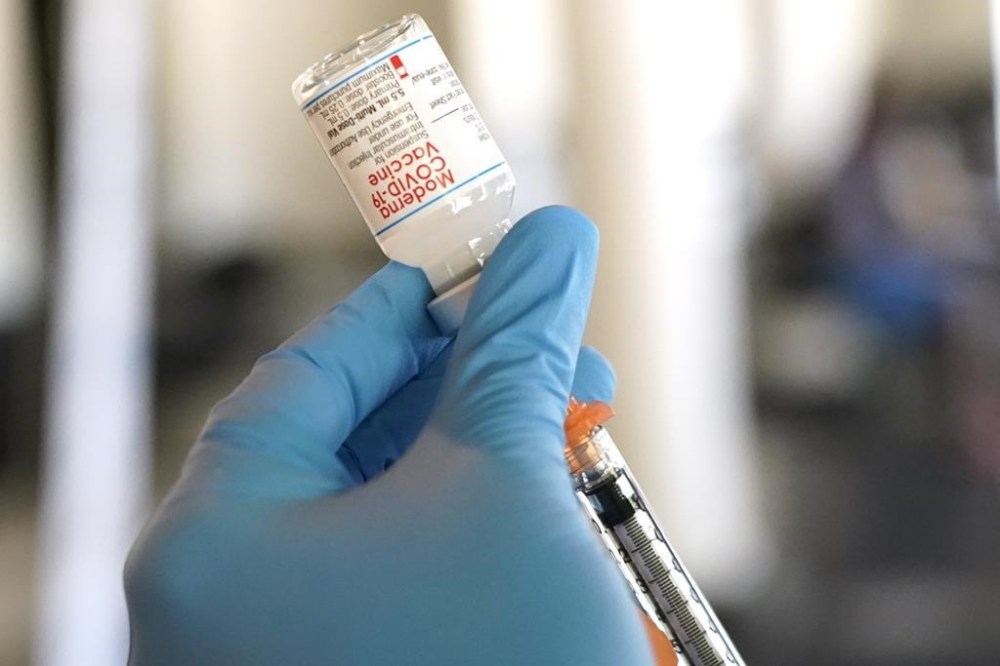Experts warn against booster delay
Advertisement
Read this article for free:
or
Already have an account? Log in here »
To continue reading, please subscribe:
Monthly Digital Subscription
$19 $0 for the first 4 weeks*
- Enjoy unlimited reading on winnipegfreepress.com
- Read the E-Edition, our digital replica newspaper
- Access News Break, our award-winning app
- Play interactive puzzles
*No charge for four weeks then billed as $19 plus GST every four weeks. Offer only available to new and qualified returning subscribers. Cancel any time.
Read unlimited articles for free today:
or
Already have an account? Log in here »
Hey there, time traveller!
This article was published 18/09/2022 (828 days ago), so information in it may no longer be current.
Delaying a COVID-19 booster shot appointment to wait for expanded bivalent vaccine eligibility may not be the best option as transmission levels are predicted to rise this fall, a national network of COVID-19 researchers is recommending.
A fourth-dose booster, bivalent or not, is better than no fourth dose at all, according to the Coronavirus Variants Rapid Response Network.
The bivalent vaccine became available this week to Manitoba seniors over 65, people with select immunocompomising conditions and Indigenous adults over 18. All health-care workers, first responders, personal-care home residents and inmates in jail are also eligible. The first appointments opened up Sept. 14 for the bivalent booster, which is formulated to target the initial Omicron variant in addition to the original COVID-19 strain.

The provincial government has not released any figures to show how many people have booked appointments or received the bivalent vaccine so far. Free Press requests for those figures were not answered Friday. Monovalent fourth doses were initially offered to Manitobans over 50 starting in late May. As of early June, less than 12 per cent of the eligible population had received it.
The province had planned to wait to roll out fourth doses to everyone until it had enough supply of the new bivalent vaccines. As of Sept. 12, general eligibility opened up for the monovalent booster, meaning all Manitobans are now eligible for a fourth dose, but the province has recommended people wait to get the bivalent vaccine instead. There’s no specific word yet on when the bivalent vaccine will be available to everyone, but the province stated eligibility will be expanded to all Manitobans 18 and up “in the coming weeks.” As of this week, Manitoba was set to receive two shipments of bivalent vaccine totalling more than 105,000 doses.
The Coronavirus Variants Rapid Response Network, a team of interdisciplinary researchers from across Canada, sought to answer the question of whether Canadians should wait for the bivalent vaccine. They say no, not necessarily.
“The bivalent is a better choice than the original recipe,” said Jen Gommerman, who specializes in vaccine protection for the rapid response network. Gommerman, a University of Toronto professor and Canada Research Chair in tissue-specific immunity, said the bivalent vaccine does boost the immune system better than the monovalent booster against the current strain of the Omicron variant.
“So it gives you an edge against BA.5 compared to the original recipe, but it’s not a huge advantage, so if you were faced with a choice, obviously you want the one that’s slightly better, but if you are faced with a new wave, an eighth wave, and cases are soaring, then you take what you can take.”
She advised people to monitor wastewater data and consider transmission levels in their area to help them make their decision.
“If transmission levels are high — and we’re heading into a wave — then you should get the one that’s available now.”
The latest wastewater data gathered by the City of Winnipeg and published by the federal government shows levels of COVID-19 are remaining steady or slightly increasing in the city. The south end of Winnipeg saw an increase in viral load, while levels stayed consistent in the north end and west end, as of Sept. 12, according to data released Friday. Over the past month, wastewater surveillance has pointed to climbing rates of COVID-19, following a dip in late June and early July.
An even newer vaccine formulated to target the BA.5 Omicron subvariant is not yet approved in Canada, but the fact new vaccines are being developed, studied and approved so quickly against COVID-19 means “keeping up with it is becoming more and more possible,” Gommerman said.
“I think it’s safe to say we’re getting better about being quick about responding to these new variants, so boosters will emerge in the future as the variants emerge.”
katie.may@winnipegfreepress.com

Katie May
Reporter
Katie May is a general-assignment reporter for the Free Press.
Our newsroom depends on a growing audience of readers to power our journalism. If you are not a paid reader, please consider becoming a subscriber.
Our newsroom depends on its audience of readers to power our journalism. Thank you for your support.
History
Updated on Monday, September 19, 2022 9:18 AM CDT: Adds tile photo

